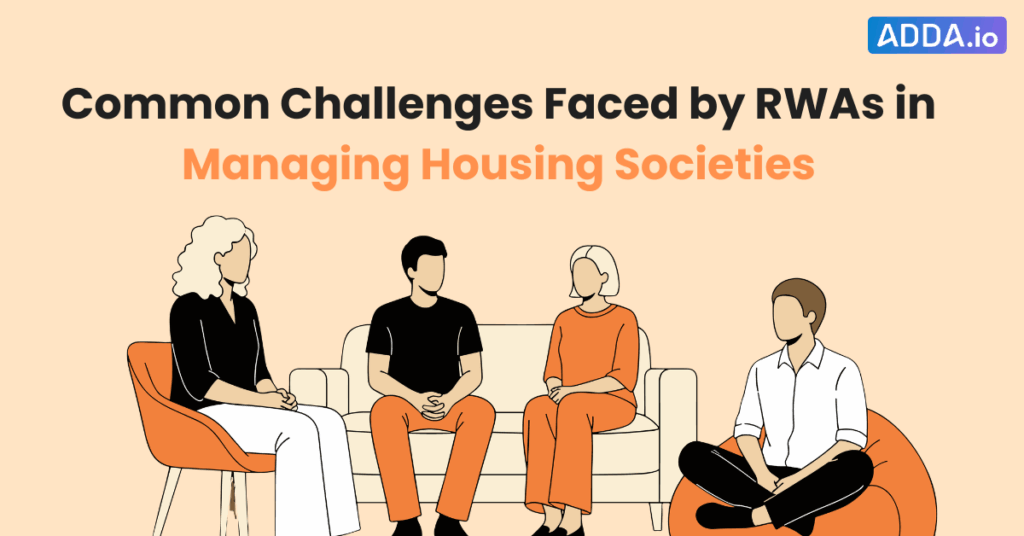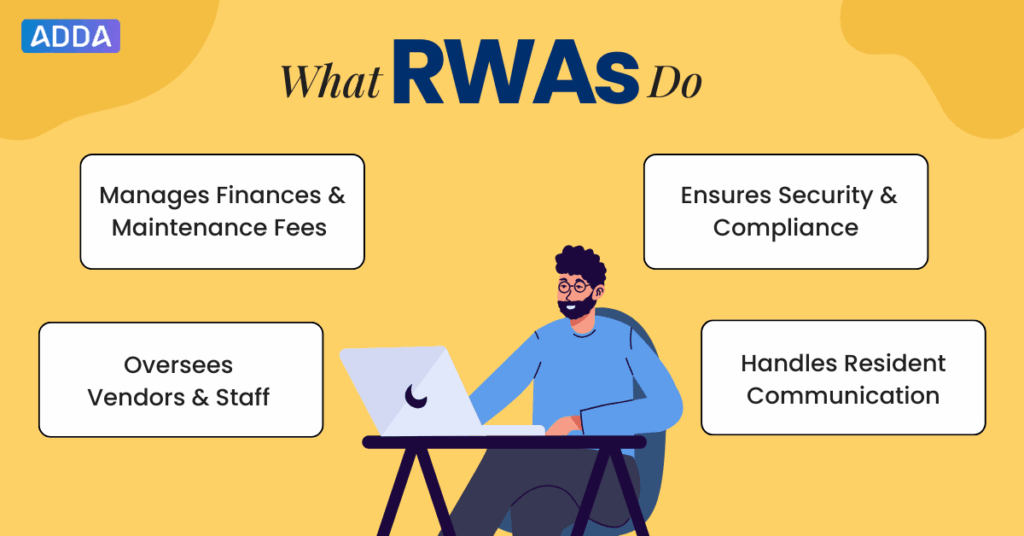
Managing a housing society may look simple when we see it from the outside. But anyone who has been part of an RWA knows how many small tasks sit behind each peaceful day in the community. These are the people answering calls during water issues, checking with vendors, sorting bills, and guiding residents when something needs attention. Most of this work goes unnoticed, yet it keeps the community running smoothly.
Table of Contents
Who Runs a Housing Society and Why It Matters

A housing society is managed by a committee formed by the residents, with members chosen through an election process. The key roles usually include a Chairperson, Secretary, and Treasurer, who take care of the important administrative and financial duties. Along with them, other committee members support tasks related to maintenance, coordination, and community decisions. While every resident owns a share of the property, the committee handles the daily work needed to keep the community organised, safe, and well-maintained.
Key Challenges Faced by RWAs in Managing Housing Societies
On paper, managing a housing society sounds simple collect maintenance, pay bills, and keep things clean. But talk to anyone on an RWA committee, and they’ll tell you it’s like running a mini city. Every day brings a new surprise, a late payment, a vendor delay, or a resident complaint that needs urgent attention.
Here are some of the most common challenges faced by RWAs in managing housing societies across India.
1. Financial Tracking and Clear Records
RWAs manage maintenance bills, vendor payments, and cash flow for the entire community. Manual entries lead to confusion about dues, penalties, and expense approvals. Residents expect clarity on how money is used, but preparing reports takes time. This creates pressure on committee members who must ensure accuracy at every step.
2. Compliance and Legal Responsibilities
RWAs handle GST, audits, contract renewals, safety certifications, and state-level by-law requirements. These tasks require careful documentation and timely submissions. Most committee members do not come from legal or accounting backgrounds..
3. Communication and Resident Coordination
Important messages get lost in busy chat groups and forwarded content. Residents often miss key updates and repeatedly request the same information. RWAs spend extra hours clarifying notices to different people. Without a structured channel, communication becomes one of the biggest daily challenges.
4. Vendor and Facility Oversight
RWAs coordinate with security teams, housekeeping, plumbers, electricians and many other service providers. Tracking their work, renewals and payments manually takes effort. Delays happen when tasks are not logged or followed consistently. This impacts maintenance and daily operations for the entire society.
5. Technology Use and Data Safety
Communities try different apps to manage society work, but some tools are complex or filled with ads. Residents hesitate to share personal information when privacy feels uncertain. When adoption drops, RWAs return to manual work. This slows down processes and increases workload for members.
6. Resident Complaints and Issue Resolution
Daily complaints include parking, noise, facility usage, and minor disagreements. Without a proper system to log and track issues, follow-ups are delayed. Residents expect quick answers and updates. RWAs spend more time managing conversations than solving the actual problem.
7. Volunteer Workload and Committee Changeover
RWAs are volunteers who balance society work with their jobs and family responsibilities. As tasks increase, fatigue sets in and decisions slow down. When a new committee takes over, previous records and processes are often scattered. This leads to repeated work and a fresh learning cycle every year.
8. Waste Management and Sustainability Requirements
Rules around segregation, water saving, and energy efficiency require planning and monitoring. RWAs want to implement these initiatives but need tools and resident participation. Without proper tracking, progress is slow and difficult to measure. This makes long-term sustainability work harder to maintain.
How Society Management Software Helps Solve These Challenges
Society software helps reduce much of the everyday pressure RWAs handle by bringing all important tasks into one organised system. Here are five key ways it makes community management easier.
- Automated Billing and Payments
Monthly invoices, reminders, and online payment options reduce delays and keep collections steady. - Clear Communication
Announcements reach residents instantly through a structured space, avoiding message overload in chat groups. - Easy Complaint Tracking
Issues are logged digitally, assigned to the right staff, and tracked until resolved, making follow ups simple. - Organised Vendor and Staff Management
Contracts, attendance, and maintenance schedules stay in one place, reducing confusion and missed tasks. - Secure Visitor and Gate Management
Digital approvals and entry logs bring clarity and order to gate operations, improving safety and tracking.
Why ADDA Stands Out as the Most Trusted Choice for Housing Societies
Many platforms can automate tasks, but ADDA is built specifically for apartment communities and has supported RWAs for over 15 years. Its focus on simplicity, privacy, and transparency makes it reliable for societies of all sizes.
How ADDA Helps Communities Run Better
- Zero Ads and Zero Data Sharing ensure complete resident privacy.
- ADDA Books automates billing, reminders, and accounting, helping communities maintain steady collections.
- Smart Announcements deliver verified updates instantly to all residents.
- AI Helpdesk logs issues in any language and auto assigns them for faster resolution.
- Facility, Vendor, and Asset Management keep operations organised and predictable.
- Compliance and AMC Tracker prevent missed deadlines and penalties.
ADDA brings all essential functions into one clean, connected platform, helping committees work with confidence and reducing the overall workload of community management.
Conclusion
RWAs handle many tasks that keep daily life smooth for residents, and these challenges can feel heavy without the right support. With clearer processes, calm communication, and dependable tools, communities can operate with more ease and confidence. ADDA helps societies move towards an organised, transparent, and future ready way of functioning. When systems run smoothly, the entire community benefits.
FAQ‘s
1. What are the biggest challenges RWAs face in managing a housing society?
RWAs commonly struggle with manual billing, low maintenance collection, high defaulter rates, lack of transparency, poor communication, vendor and staff management issues, compliance risks, and absence of a centralized system. These operational gaps increase disputes and reduce resident satisfaction.
2. Why do maintenance collections get delayed in most housing societies?
Manual invoicing, unclear dues, lack of automated reminders, and miscommunication between committees and residents lead to poor collection rates. In many societies, 20–40% of residents become defaulters due to inconsistent processes.
A centralised ERP like ADDA Books helps increase collections by up to 80% with automated invoicing, reminders, and transparent payment records.
3. Why is communication such a major problem for RWAs?
Most societies depend on WhatsApp groups or emails, which create message overload, misinformation, and no official record. Important notices often get lost among casual messages.
A structured communication tool ensures residents get verified updates instantly—something that ADDA’s Announcements + Community Guidelines system solves with 60-second-wide broadcast delivery.
4. Why do RWAs struggle with compliance and legal responsibilities?
RWAs must follow GST, TDS, local by-laws, statutory audits, RERA rules, and safety norms. Lack of documentation, missing AMC renewals, and manual tracking result in penalties and legal risks.
Many societies unknowingly violate compliance simply because there is no system to track deadlines.
5. How do data privacy issues affect RWAs using free or ad-based apps?
Free apps often monetize resident data through ads or third-party integrations. This leads to:
• Loss of trust
• Residents uninstalling the app
• Critical society messages getting lost among promotions
• Legal risk for the RWA (because sharing resident contact details with ad platforms is not allowed)
This is why privacy-first platforms like ADDA (Zero Ads, Zero Spam) are preferred by high-governance communities.